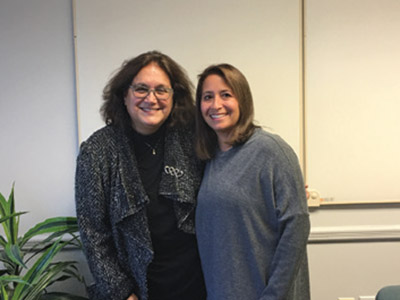
In last month’s column, NS shared with us the trials and tribulations and hopes and prayers of a parent of a child dealing with addiction issues. We were gratified to hear from readers who appreciated finally seeing some of what they’ve been feeling in print. It is important to share with our readers the understanding that addiction is an illness, not a choice, and we hope that this column will help in clarifying that.
This month’s contributor is Rabbi Richard Kirsch, a guidance counselor, athletic director and teacher at the Rae Kushner Yeshiva High School in Livingston. We thank him in advance for his insightful message.
Parshat Teruma deals almost exclusively with the Tabernacle, which Moses and the children of Israel built in the desert. There are three words that are used to describe the three dimensions of the Sanctuary and its holy vessels. They are orech (length), rochav (breadth) and koma (height). In discussing these specifications, the commentators said that just as the sacred objects in the Tabernacle were of three dimensions, so must a good person possess character in three dimensions. Each of us should have orech, rochav and koma.
Most of us know how to meet the unusual circumstances of life. Their novelty and excitement challenge and enrich the best that is within us. But when it comes to the ordinary, mundane tasks that are before us daily, that is quite another matter. We tend to get bored with the drudgery of having to go to work, doing the same chores, seeing the same people and facing the same challenges. We look at other careers, other people’s lives, and say to ourselves, “… now, that’s living!”
Everyone has to face the problem of monotony with reference to the “orech” of our lives. However, it is our attitude that determines whether or not we will be happy and successful in our work. If we learn to meet our ordinary assignments in an extraordinary manner, we can remove much of the tedium from our lives. When people do their work in a lackadaisical manner, their days will drag, seemingly eternally sometimes. Let them put their best effort into their job and they will feel a sense of pride and accomplishment. Their days will fly.
We are also reminded about “rochav.” This is meant to generate an interest in life that is not directly involved with our business or profession. The acquisition of breadth of character reminds us to never be too busy to share in the sorrows and joys of our brethren.
Our lives are further enriched with the third dimension, “komah.” This is referring to religious devotion and faith in Hashem. When the psalmist wishes to express his trust in Hashem, he describes it in terms of height: “My help will come from the Lord, creator of heaven and earth.” That is the Jewish perspective of height—lifting one’s soul and one’s spirit unto Hashem. We must indulge in soul-searching, which is the real meaning of tefillah and its Hebrew root, palel, which means self-searching and self-analysis. We must ascertain, with honesty and accuracy, the areas in which we have failed and why.
Unfortunately, our struggles in developing orech, rochav and koma can sometimes lead to choices that may miss the mark—especially when it comes to abusing drugs and alcohol. The aftermath of these poor choices often creates distorted perceptions of everything that is sacred in Jewish life. Have we not taken to heart the efficacy of repentance? Did the spirit of the Yamim Noraim last only during that season? Only by returning to our “orech, rochav and koma” can teshuva from the heart truly guide us back. Sometimes we stray from our path, and then we need guidance to help us return. As an educator, I see this challenge with our teens. As a community, we need to show those who are hurting that they do not stand alone. Hashem has offered us Divine guidance if we are willing to take that first step, and sometimes we need outside assistance to do so.
That is why we must attire ourselves in bigdei malchut—royal garments. Our “royal garment” includes more and more personal religious commitments. Those commitments will help bring us closer to Hashem and allow us to accept His Divine guidance. As an educator, that is something that is stressed with our students—the importance of personal commitment to growth, outside assistance when necessary, and Hashem’s Divine guidance in all things.
With the holiday of Purim approaching, let’s take this opportunity to add the quality of koma to our lives. Let us strive to elevate toward Hashem—to the best version of ourselves. It is possible. After all, the megillah is named for Esther, and Megillat Esther stresses the primacy of hope.
Eta Krasna Levenson is a clinical social worker who currently runs a free peer support group for parents with teens and young adult children with mental health challenges, and is now looking to develop a support/bereavement group for parents who have lost children. She can be reached at [email protected].
By Eta Levenson and Lisa Lisser
Lisa Lisser is a Jewish educator who is committed to addressing addiction in the Jewish community and helping to lessen the stigma and shame associated with it, along with providing resources so that parents and family members of those struggling can find their own sources of resilience. Lisa can be reached at [email protected].










